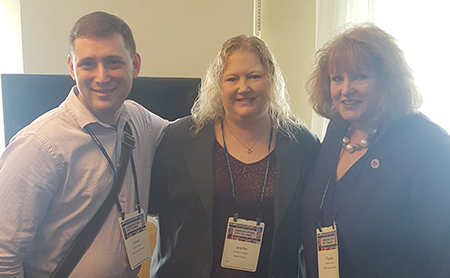Learning Civility


Project Civility, which began as a reaction to a specific incident, has not only become a movement at Miami University Regionals, but is now the subject of academic study.
Miami Regionals faculty members Leland Spencer (Interdisciplinary and Communication Studies) and Pamela Tyahur (Languages, Literatures, and Writing), along with Jennifer Jackson of the Oxford Campus (Media, Journalism, and Film), have published “Civility and Academic Freedom: Extending the Conversation” in the Journal of Contemporary Rhetoric. Drs. Spencer, Tyahur, and Jackson presented a version of their paper at the National Communication Association convention in Philadelphia on Friday, November 11.
Dr. Tyahur said the incident took place in the Hamilton campus cafeteria involving a special needs student and was egregious enough to come to the attention of the Student Government Association. Associate Dean Dr. Bob Rusbosin, who was also the advisor for SGA, led to the establishment of Project Civility “to recognize civil deeds and to help people focus on the positive rather than the negative.”
She said she “raised her hand heartily” when Dr. Rusbosin asked if she would be on board to put such a movement in motion.
“I always want students to feel comfortable coming to me to have an open communication and be civil,” she said. “Little by little, we built the program from baby steps to where it is today.”
The first campaign, still on-going, involves wooden nickels, tokens with the group’s logo, that members carry around with them and hand out to people they see doing good deeds, acts as simple as opening a door, for instance.
Project Civility soon branched out into the community with members helping to form the Hamilton City of Character initiative and were called on to help a local high school deal with the aftermath of a shooting incident.

Drs. Leland Spencer, Jennifer Jackson and Pamela Tyahur.
The paper came about, Dr. Spencer said, as a response to some of the criticism that has been aimed at civility initiatives.
“In Project Civility we have an answer to the academic conversation of whether civility functions to shut out voices,” he said. “On this campus at least, civility has functioned to welcome more voices.”
Knowing that Dr. Jackson had previously done some research on civility and First Amendment issues, he reached out to her as well as Dr. Tyahur to collaborate on the research and writing.
“I really do believe that if you are taught how to be civil in society, it opens the door for more opinions and more conversation than if you're uncivil with each other,” Dr. Jackson said. “I try to lead by example with my students. When I teach public speaking classes and we have discussions about tough topics like the current political climate in the country, we can't have that conversation unless we are going to agree that everyone is entitled to believe differently but we have to be polite with how we address those differences.”
Dr. Spencer said, “The inspiration for doing the essay was to speak back to that conversation, but also to tell the story of this student organization in a scholarly form, to contribute to the theoretical and critical argument in the field.”
With a largely positive reaction from the academic community, the trio is already considering follow-up articles and research. What form that might take would depend on any formal responses to their paper.
“We've now contributed to a debate that's going on in the field,” Dr. Spencer said. “If somebody wants to respond then, yes, we would answer them back civilly.”
“I’m excited to be able to write with Leland and Jennifer as well as be a participant and an adviser for such an important group on campus,” Dr. Tyahur said. “College is a place where people have the opportunity to say just about anything that comes to their mind. They should be able to. When they were in high school, they couldn't do that. They were in trouble if they said the wrong thing or if they used curse words or if they disagreed with the teacher.
“A university should be a place in students’ lives where they define themselves. Part of that process is learning to be civil in the time when they are able to discover what another person believes.”
** “Civility and Academic Freedom: Extending the Conversation” may be downloaded for free at contemporaryrhetoric.com/.

